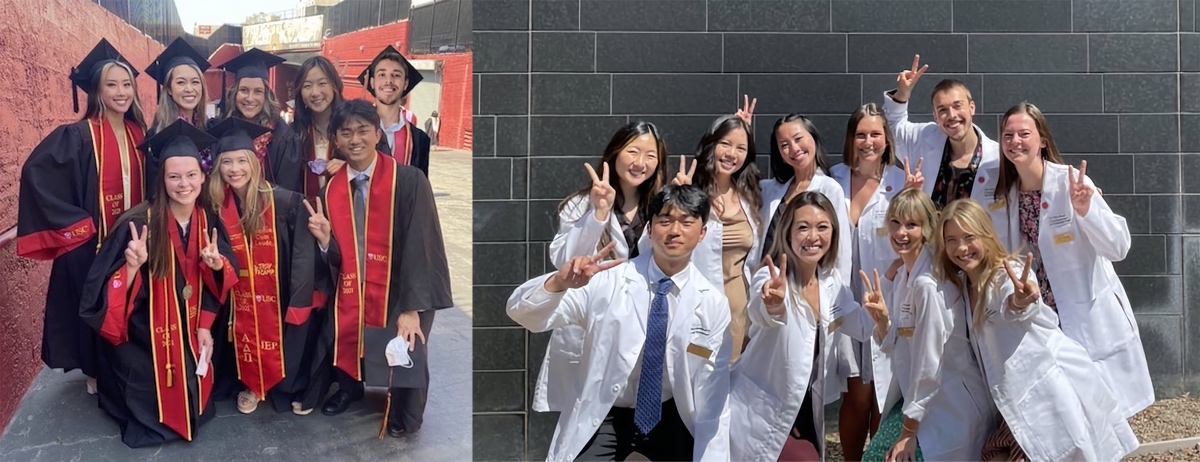Student Blog
Classes
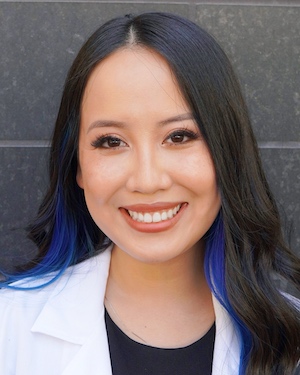
ABC and 1, 2, Three ⟩
December 29, 2021, by Teresa
Classes
With the way the Master’s program is set up, there are 3 practice immersions, which is an 8-unit course you take each semester that focuses on a primary area of practice in occupational therapy. The focuses are on adult physical rehabilitation, mental health, and pediatrics. (For the entry-level OTD, there will be an additional practice immersion focused on productive aging and geriatrics!) My entire class is split up into 3 different cohorts of about 40 students and each cohort takes these practice immersions in a different order. I’m in Cohort C, meaning I started the program last year taking pediatrics, adult rehab last spring, and just recently finished mental health this fall. In honor of the third to last day of Blog-mas, I’ll be sharing 3 main takeaways I learned during each of the 3 practice immersions!
Pediatrics
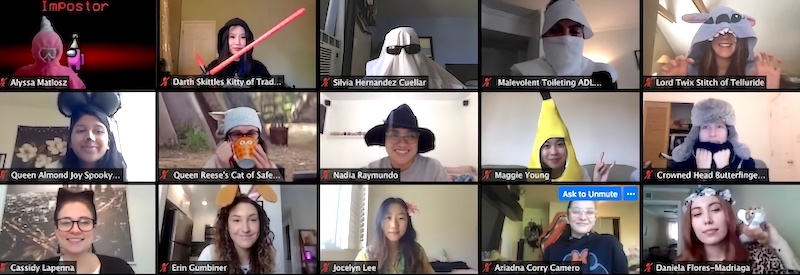
Fall 2020 feels like a fever dream. I miss it, though. *sigh*
- In this immersion, we were introduced to the infamous documentation process. We learned how to take SOAP notes as well as the importance of documentation. Being an OT is not just delivering services to a client — you have to take notes on what you did so you can remember, so that other providers can reference them, and so that you are properly compensated for your services!
- We also learned about how your “client” not only includes the one person you directly provide OT services to, but also encompasses their family and/or support system. It’s important that you include the appropriate people as part of treatment, because they can offer pieces of information which will be vital during the treatment process!
- One of my biggest hesitations about working with children was not being able to speak with them verbally in order to elicit what their needs are. However, we learned about signs and methods of nonverbal communication, many of which apply to adults as well!
Adult Physical Rehabilitation
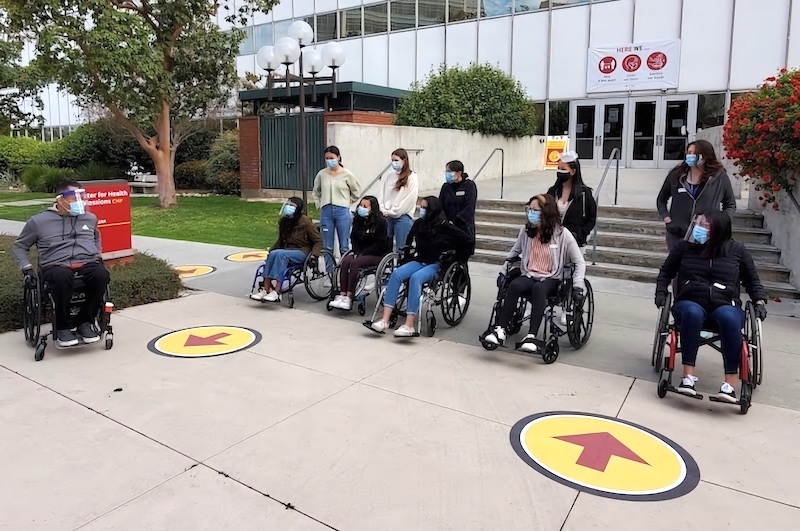
Getting to go on campus once a week for hands-on practice immersion labs and meet my classmates in person during Spring 2021 was such an exciting time!
- In this immersion, we learned about the evaluation process in further detail and how important it is to establish a baseline during your first encounter with a client because it will determine what the rest of their treatment looks like. However, with OT being such a holistic profession, there are so many things you’ll want to know about your client from the start! This immersion is scaffolded so wonderfully and in harmony with the fieldwork experiences that by the end of the semester, you become comfortable with this process!
- Almost every class, we’d hear that the most important thing to remember when working in an adult rehab setting is to “meet people where they’re at” — both physically and mentally. If your client is unable to stand, meet them where they’re at and have a seat yourself — don’t physically talk down to them. Additionally, your clients are the experts of their own lives and the last thing you want to do is have them overexert themselves, so make sure your interventions match their capacities and goals!
- In keeping with that, never assume someone’s capability, identity, or thoughts. Foster an open space to nurture and maintain the therapeutic relationship between you and your client. For example, USC provides us with name badges that include our pronouns (mine are she/her/hers) and the presence of this alone has sparked many important conversations during my fieldwork experiences. Again, they are the experts of their own lives, so check in with them often to make sure their needs are being met.
Mental Health
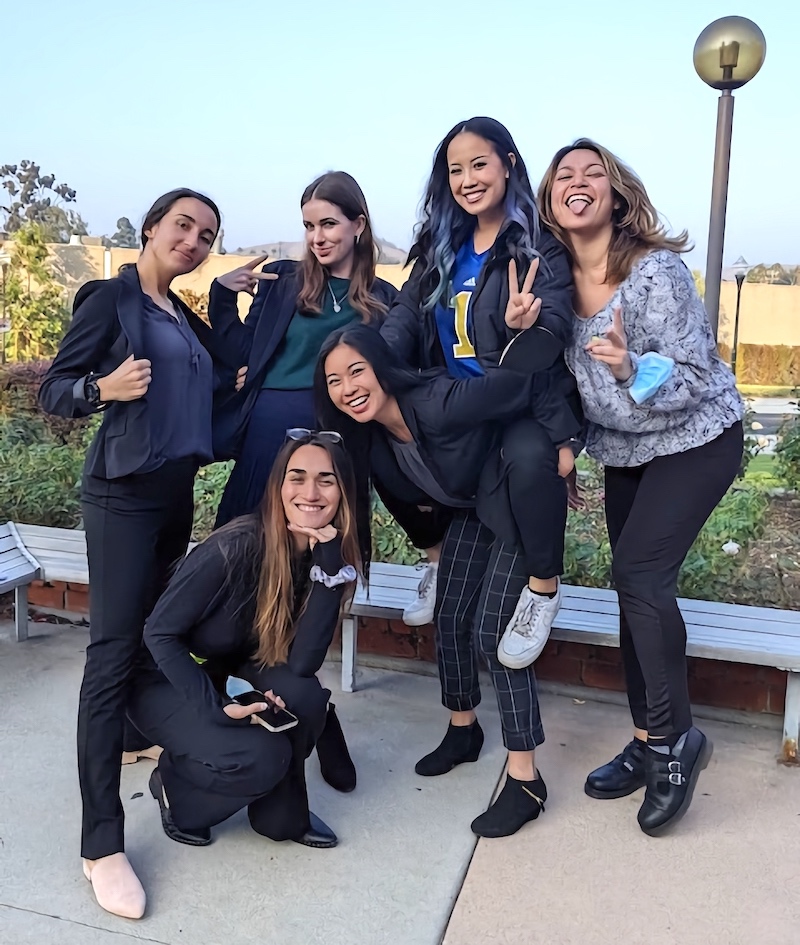
The best Team-Based Learning group to ever exist! Gimme, gimme MORS, gimme MORS, gimme, gimme MORS 😢
- In this immersion, we learned how important it is as entry-level OTs to use standardized assessments correctly as we garner experience and continue to develop our clinical identity. These assessments are founded on evidence-based practice and were developed and researched with a clear purpose in mind to guide the treatment process in a way that is proven to work!
- In certain areas of OT practice, there is also a need for providers to “do whatever it takes” in order to facilitate your client’s recovery which may extend beyond traditional care. While this may sound intimidating, it aligns with the holistic approach of occupational therapy in that it emphasizes how each individual requires unique, individual needs and requires providers to immerse themselves in the process in order to meet these needs.
- Maybe it was because this was our first semester fully in-person, but I was able to truly understand the importance of teamwork within any group setting — from the classmates you sit next to every day, to your cohort, to your entire graduating class, as well as the teams you’ll go on to be a part of as an OT. For any given topic, everyone in a team will offer a different perspective which you might not have picked up on because you, yourself have a different perspective based on who you are as a person and not that any perspective is the right or wrong one, but the collaboration offers a space for boundless solutions.
To end Day 3, I’d also like to feature the 3 cohorts of the Entry-Level Master’s program class of 2022! Cheers to everything you’ve all accomplished in 2021 and here’s to all the memories to be made during our last semester together!
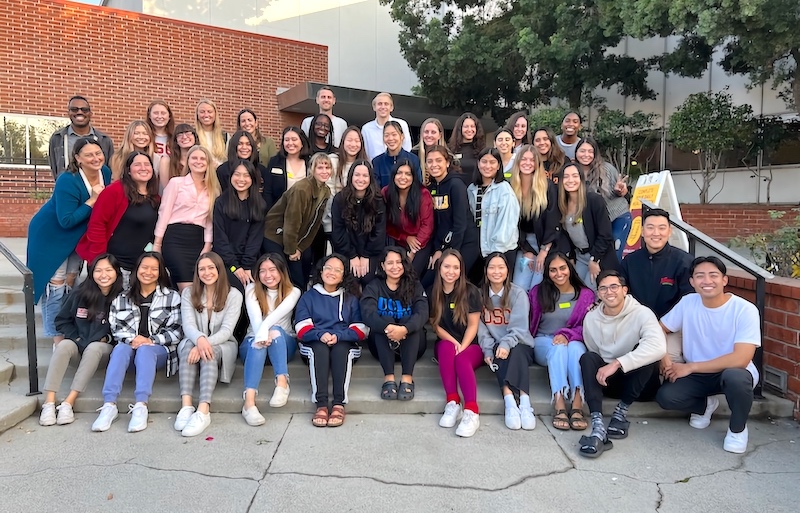
Cohort A (Photo courtesy of Earl Sy)
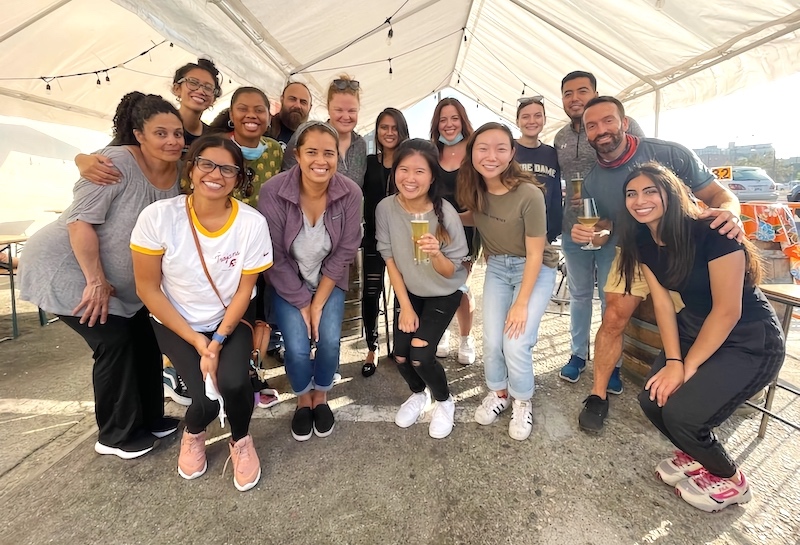
Some of Cohort B (Photo courtesy of Stefanie Kuizon)
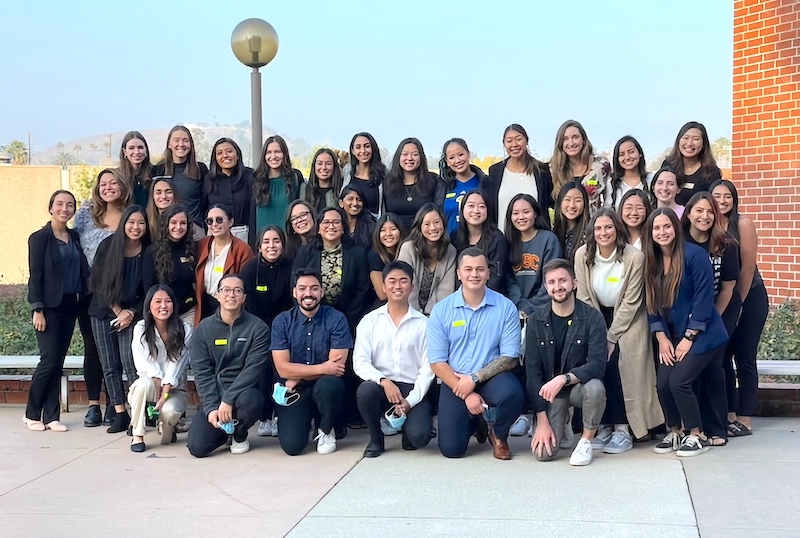
Cohort C (Photo courtesy of Camille Hazen)
I cannot wait to see you all become some of the best occupational therapists this profession has ever seen. ❤️
⋯
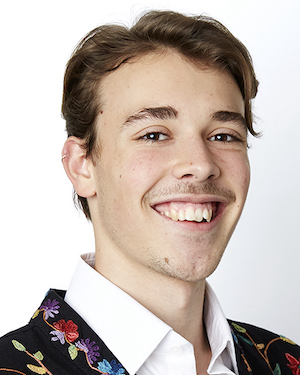
A Few (5) of My Favourite Things ⟩
December 27, 2021, by Seth
Classes
It’s the time of the year where time is on everyone’s mind. I mean, it’s kind of hard for it not to be when four days from now many of us will be watching a giant clock countdown to the Gregorian calendar new year. As I prepare for the year to come, I’d like to reflect on the years that have passed, specifically the past five years of the BS-MA program, and share with you all my favourite things from each year. I’ve already shared about my BS-MA cohort, so this will focus on the progressive degree experience itself. As I mentioned before, the program offers you a breadth of flexibility in designing your own experience while also being structured with prerequisite courses before you officially enter the graduate program. With that said, no two students’ journeys are alike.
Year 1: An Introduction to OT and OS
This is where the magic begins! The first year is where, at the very least, you take OT 250 and I cannot imagine a better start to the USC Chan journey. It’s a sort of an all-you-can-eat buffet of OT where you’re exposed to the breadth of what OT brings to the table. This course covers motivational interviewing to lifestyle redesign, flow to challenge-skill balance, stress management to sleep, habits and routines, and much, much more. As a testament to how much I enjoyed this class, I remember the final with Dr. Kate Crowley like it was yesterday. My group was assigned to present on the stress management module and we chose to recreate a traffic scenario one of my group members had experienced. We converted the wheely chairs in the classroom into cars and re-lived the experience in front of the class with classic movie voice-overs to narrate the scene and what was happening in the body. Now that’s how you end your first semester the right way!
Year 2: The Intercampus Shuttle
Depending on the specific way your cookie crumbles this moment may come sooner, but by year two you’re ready for the intercampus shuttle! USC has shuttles that go to many places, but the intercampus shuttle stops at the main campus (UPC), Union Station, and the health science campus (HSC). The shuttle runs about every 30 minutes or so and takes about as long. Believe me when I say, to this day I still love this bus. It’s the perfect time to catch up with your cohort, listen to some music, nap, or cram in some last-minute studying for anatomy or physiology. More than this, it made me feel like a ✨professional!✨ You’re commuting, you’re on a health science campus in the heart of OT at USC, and living the dream. Honestly, they might as well just hand you your degree right then and there (well, maybe not yet, but you’re definitely on your way)!
Year 3: Foundations
Although split between year three and year four, this is when you start taking the graduate-level foundational courses and it is designed in a way that makes the transition so smooth. This year is when you wrap up any double majors or minors so you’re still taking an interdisciplinary course load, but you’re starting to get into the bread and butter of OT at the same time. This time is precious because you take these foundation courses with your BS-OT cohort. Not only are you strengthening those relationships, but you’re also starting to build new relationships with the graduate faculty in a more intimate classroom setting. From the small group discussions and practical applications to the professor interactions, this experience brought everything I learned up until this point into focus and I felt prepared for the next chapter of the program.
Year 4: A Program Within a Program
And the time has finally arrived, you are a graduate student! If that isn’t exciting enough for you, you’ve now also expanded your network of OT-lovers to include 140 more people! Although this may feel intimidating at first, you will be split into a smaller immersion cohort with whom you will travel through the rest of the program. This program within a program includes Mental Health, Pediatrics, Adult Physical Rehabilitation, and the newly introduced Productive Aging and Geriatrics immersions. Year 4 will continue the building on Year 3’s foundations while also guiding you to be responsive, reflective, and engaged in your future practice and giving you a taste of what that practice could look like. This year is so exciting because you start to feel what it’s like to be a real-life OT!
Year 5: The Freedom to Choose
As I am still in my fifth year, I cannot capture it in 20/20 hindsight, but I can share something that I am sure will be my upcoming favourite. Sometimes you just don’t click with a required course which, I’m here to tell you, is not a bad thing! It’s a good sign that you are starting to hone in on the OT you want to be and in year five you get the chance to create your own adventure. When you reach this point in the program, you’re able to start selecting the electives you’d like to take before graduating. These courses can contribute to advanced certifications, enrich your knowledge in a particular practice area, or just help you strengthen your general skills as an OT and you get to choose them! It’s like being a first-year again, but this time you know what you’re looking for. The freedom to choose goes beyond electives, however, and also encompasses your next steps. What type of residency would you like? What practice area will you pursue? Will you seek out any additional degrees? Take some time to reflect on everything you’ve done so far and start asking yourself these questions. The future starts now!
Although I advertised 5 favourite things, in the true spirit of looking forward, here is a bonus sixth favourite thing to celebrate the sixth year of the new BS-OTD!
Year 6: The Last Chapter
The fact that you have to say goodbye makes the journey up to that moment all the more special. Relish each year you have here and carry it, and the people you met along the way, with you as you move forward, but do move forward. You’ve put in the work and you are ready. Here’s to graduation (whenever that may be for you)!
⋯

9 Perfect Strangers: A Cohort’s Connection ⟩
December 21, 2021, by Seth
Classes Community
Here at USC, we often talk a lot about the Trojan Family, but when you arrive on campus as a first-year that sentiment can feel intangible. But the truth is, for me, I found my family before my first semester had started, even if I didn’t know it at the time. Traditionally, fall move-in day takes place on the Wednesday before the first day of classes and is followed by six weeks of welcome week programming. During this time many students rekindle friendships with people they met at orientation, attend Visions and Voices events, or just settle into the place they will be calling home for the next couple of years. In the case of the Class of ‘21 and ‘22 BS-MA OT students, we attended the USC Chan Division’s First-Year Welcome Dinner.
I may not remember all of the details from that dinner, but some things have stuck with me over the years. 1) I chose a completely hairless action shot of me swimming to showcase my favourite occupation as my grand debut 2) Back and forth O-H!, I-O!-ing with Dr. Samia Rafeedie and Dr. Shawn Roll whenever any of us brought up our experiences in Ohio and 3) the first spark of connection I felt when meeting my cohort for the first time.
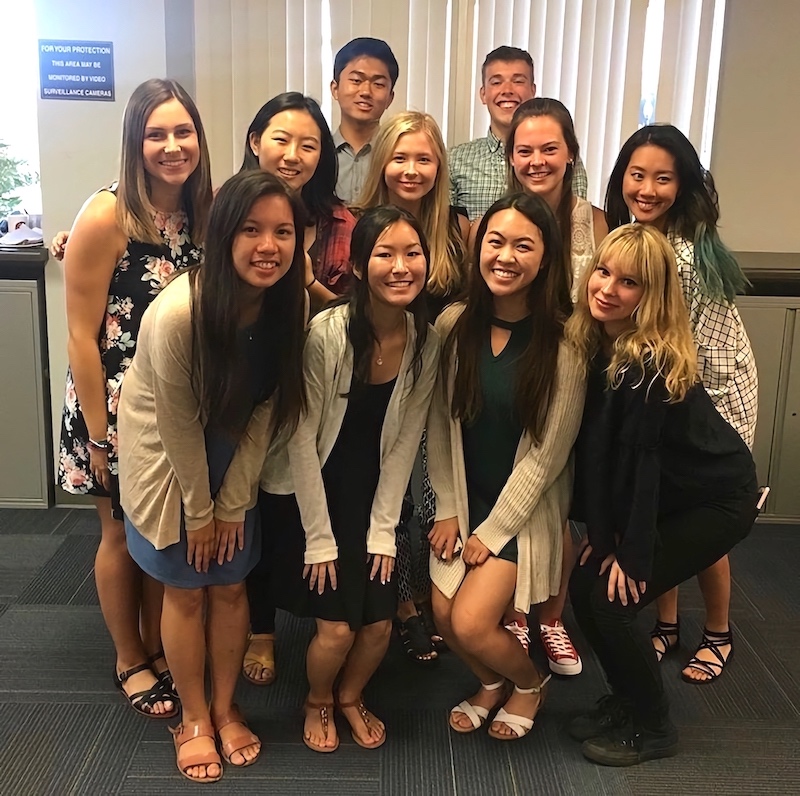
The Class of ’21 and ’22 taking their first picture together at the USC Chan Division’s First-Year Welcome Dinner
Over time that connection has grown thanks to the design of the BS-OT program. Despite the program having a built-in buddy system, it didn’t feel forced. As an undergraduate OT student, you’re granted a lot of freedom to explore what college has to offer, while also knowing you have Chan to come back to. The course sequence is laid out in a way that slowly scaffolds your knowledge of OT. This is done not only through the complexity of the content but also through the number of classes you’re taking. This all culminates when you’re fully immersed in the graduate program. But this also means that you can scaffold the cohort experience too (More details about the progressive program in a blog coming soon so say tuned)! Some OT courses allow you to select the date and time so you may see some folks one semester and the others the next (like OT250 and OT251), while there are other courses that most of the cohort will take at the same time (often anatomy and physiology). As time goes on, you’ll also start coordinating all of these together and commuting between campuses and before you know it, you’re no longer classmates, but full-on friends! From these bus rides to hiking, and rollerskating, and museum trips together with Dr. Amber Bennett, you’ll develop a support system as you head into the graduate program together. For me, this is when these friends became family.
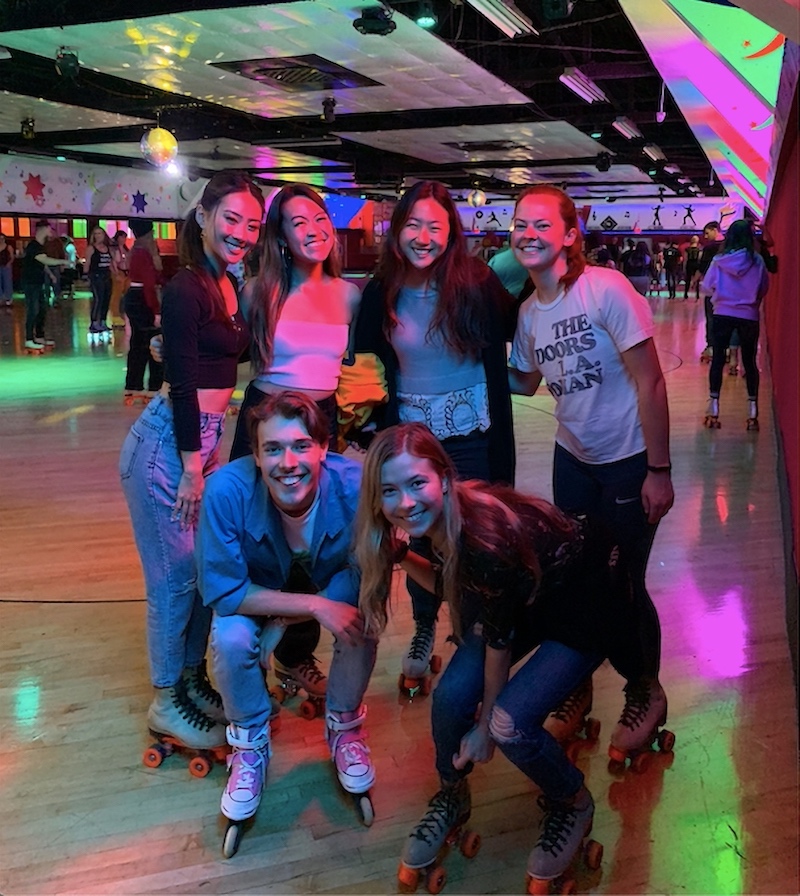
One of Dr. Bennett’s famous BS-OT outings, skaters gonna skate! 😎
Suddenly you go from the OT foundation courses that were just your cohort to the full grandeur of the 145 other OT graduate students, you’re navigating graduate-level courses full-time, commuting to the health science campus, and trying to grapple with the occupational transition. It can feel like a lot to tackle all at once, but find solace in the fact that there are anywhere from nine to fourteen other BS-OT students who are going through the same thing, not to mention the BS-OT students a year ahead of you! When I have a question I turn to my cohort first in the GroupMe we’ve had since that first welcome dinner. When discussing challenging course content, we debrief together on the shuttle. And when we want to have fun and catch up before finals, we head to brunch! Every step of the way, we’ve been on this journey together and come so far. From a welcome dinner to a COVID-19 graduation to our white coat ceremony reunion and our upcoming master’s ceremony, I couldn’t have asked for better people to be at my side. As I look towards the future, I know that no matter where our professional paths take us that together we will #FightOn forever. ✌️
My cohort celebrating our accomplishments together, one more to go! (Yes, I am photoshopped into the COVID-19 Graduation picture)
⋯
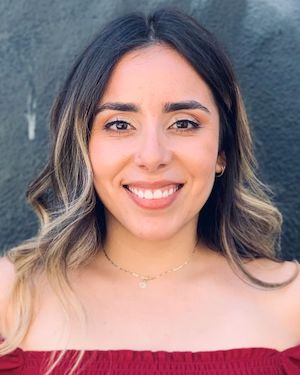
10 tips from me to you ⟩
December 20, 2021, by Silvia
Classes First-Gen Life Hacks
My DMs — and by DMs, I mean email — have been poppin’ with variations of the same question: “Any advice/tips regarding the program or in relation to pursuing higher education?”
To be completely honest, I don’t know how I have made it this far. I guess it really is fake it till you make it, am I right? When you’re a first-gen student not only do you not have people to guide you through this journey, but you also don’t know what questions you should be asking to those that may be able to advise you. There’s a lot that I wish I would have known before romanticizing the idea of being the first in my family to go to college, pero no pasa nada oiga. Ya estamos aquí, y lo que me toca a mi is to share some of the things that have helped me thrive as a student and person. I’ll preface the rest of this blog by saying that these are general tips that I have put together as I look back on my academic career, but feel free to reach out for more specific advice if you need.
Okay so here we go, Blogmas day 10 = 10 tips from me to you. 😊
10. Develop a morning routine
Morning routines are your friend. When I started the program, it was completely online, which made it easy to wake up minutes before class, roll over, grab my laptop, and log on from bed. It also made it easy to fall right back to sleep . . . oops. Needless to say, this was not a productive or effective start to my school day; I felt like I needed to do something to feel awake and alert for class in the mornings. One day I decided to wake up early to work out before class and let me tell you, it was life changing. I live by my morning routine and think we should all have one. Some one told me that there are two instances during which we can have the most control over our days — you can’t control what happens throughout your day, but you can decide how you start and end your day (for the most part). I choose to start my day with a morning routine because it sets the mood for the rest of my day and makes me feel accomplished from the get-go.
Silvia’s morning routine: wake up between 6:00 AM – 6:30 AM, do a 20-minute workout, drink a cup of water + coffee or tea, do my skincare.
9. Sleep
Raise your hand if you’ve ever been told to get a good night’s sleep before an exam because you’ll do better than if you stay up late trying to cram . . . but you still chose to stay up? I won’t raise my hand because I don’t believe in pulling all-nighters. In undergrad I may have pulled one or two, but since starting OT school, I don’t compromise my sleep. Listen to NPR’s Ted Radio Hour podcast “Maslow’s Human Needs” starting at 6:30 — you can thank me later.
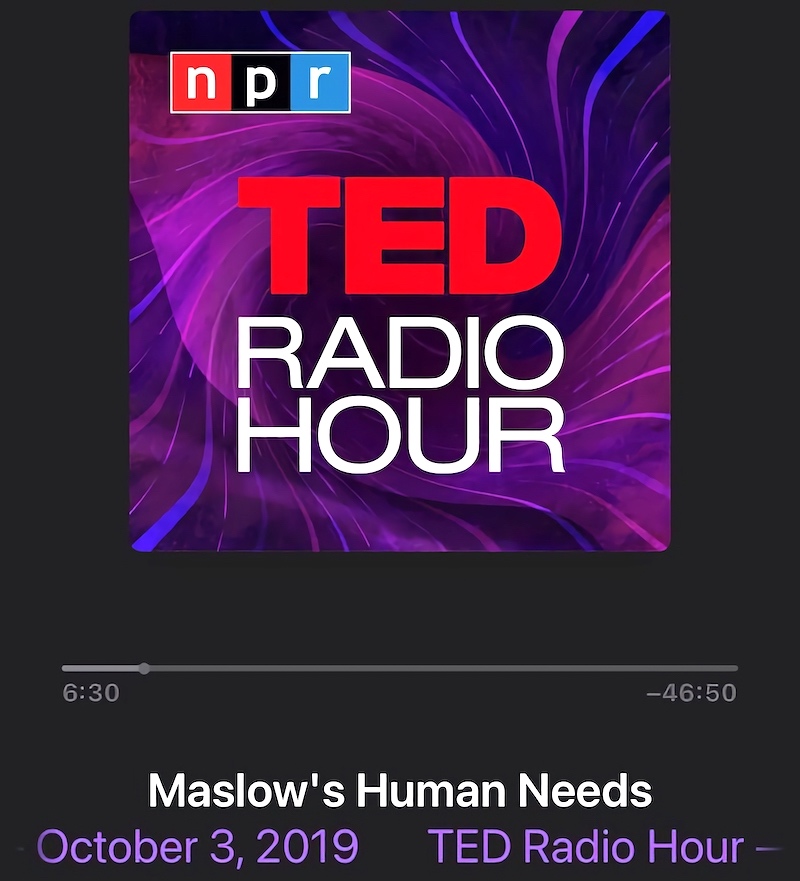
NPR Ted Radio Hour
8. Take a mental health day
That’s it. That is the advice. Don’t go to school, don’t go to work. Take a mental health day.
7. You don’t have to be productive every day
The student urge to make a to-do list of everything they want to get a head start on/finish when they have a day off is real. It’s me, I’m student. Last semester I had class Monday-Wednesday and fieldwork on Fridays. Thursdays were my free days and when I tried to be as productive as I could by getting ahead on readings or finishing assignments, on top of doing ambassador work. Some days though, I was tired and didn’t want to do any schoolwork. At first, I would beat myself up for wasting my day doing “nothing,” thinking it wasn’t “productive.” Truth is, we’ve been conditioned to think that we must always be working or on-the-go, that giving our bodies a rest seems unacceptable. But, in the wise words of my friend Amy, “It’s ok. You don’t need to be productive every day.”
6. Set boundaries
I’m not sure that I do this too well, but Kim said I do so I’m listing it here. Basically, check in with yourself and be realistic of how much you can handle. If you need to say no to something, or push a commitment back, do it.
5. What works for you, works for you
One thing about my cohort is that we help each other out. Everyone shares their study materials — whether it is a Quizlet or a study guide — and I love them for this. However, I can’t stress how important it is to know that what works for them may not work for you and vice versa. When my friends started sharing their study materials for an exam that I hadn’t even thought of, I became anxious, and the impostor syndrome kicked in. Was I smart enough or competitive enough to be in this program? I had to give myself a pep-talk to remind myself that we have all gotten here doing things differently and what works for me, works for me, anything beyond that can be used to supplement my study skills and habits. Let me know if you need a pep-talk.
4. Plan your days
I use my planner religiously. Even if my days look the same every day, I write down my schedule to a T, and try to stick to it as much as possible. Similar to my morning routine, this gives me a sense of control over my day, and there’s just something so satisfying about crossing things off as you go through your day.
3. “Not my best work” is good enough
If I had a dollar for every time I turned something in last semester and said, “that was not my best work,” I would have a lot of money, still not enough to pay my tuition, but enough to kick off my last semester of grad school with a girls trip.
For real though, doing the bare minimum is good enough sometimes. If you want to have a life outside of school, while still being a “good student,” you’re going to have to learn to prioritize which assignments need to be your best work, and which don’t. If it is a credit/no credit assignment do not spend more than an hour on it (and that’s pushing it).
2. Fake it till you make it
Pretty self-explanatory, I think.
1. Grades don’t matter
Ok, they do . . . but not really. All I can tell you is that if you’re debating between 1) depriving yourself of your favorite and restorative occupations to stress over studying to get an A, or 2) studying modestly while also balancing your other occupations and getting a B, do the latter. There’s more to life than school. You’re still going to graduate and become a great occupational therapist.
Alright friends, that’s it. I have to get back to babysitting but I’ll be back for Blogmas day 2!
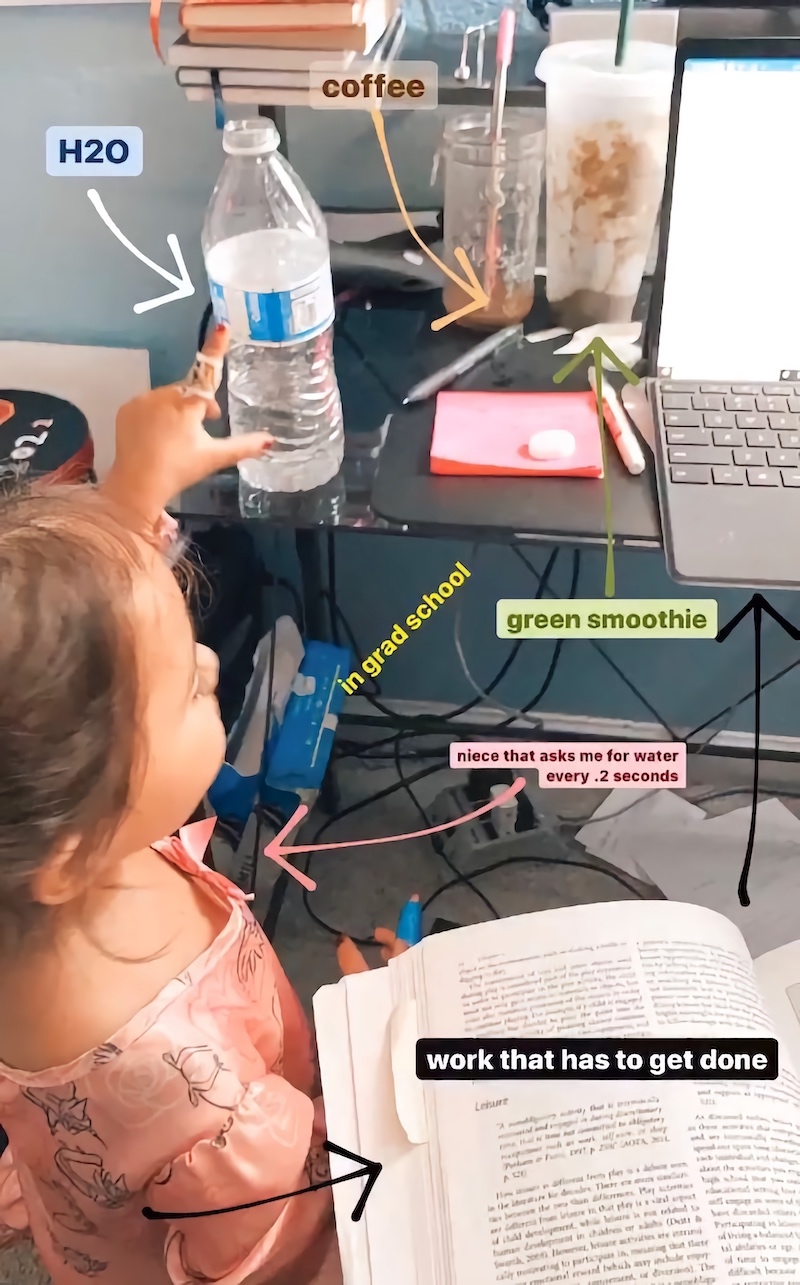
Zoom University days with my niece, Demi
⋯
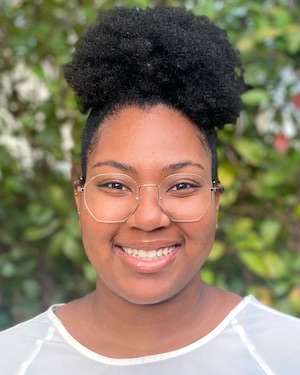
The ABCs and 123s of NBCOT Prep ⟩
November 24, 2021, by Kayla
Classes Life Hacks
The NBCOT, the certification exam that solidifies new graduates as a ~real~ OT. For most, this is the last big exam in your academic career and a reminder of just how far you have come; quite literally everything has led you to this point.
So, let’s get right into it; as with many things in life, there is bad news and good news. Bad news first, studying is going to be stressful and require discipline and dedication; but the good news, you are NOT alone and it won’t last forever. During the process of studying I eventually gathered the sense that the NBCOT is like a rite of passage; not only because every OT has to take it, but because everyone remembers that unique time and the experience of it all. Everyone you speak to is going to have study tips and advice to give you . . . so it would only be right to pass unto you the wisdom that was imparted on me. Without further ado, I give you, the NBCOT ABCs and 123s.
ABCs
N — Nail Down a Study Schedule
One of the first things you’ll want to do is create a study schedule, including determining how long you want to study overall and how many hours per day/week. The next step I took was to determine my study schedule and luckily for me (and you) there are many readily available online. I chose not to reinvent the wheel and use a pre-existing study guide because that worked for me, but creating your own is also an option. This step is all about formulating a study schedule that meets your needs and makes sense to you!
B — Build Endurance
This exam is four, count them, four hours long. A huge component to success is training your body and mind to be able to tolerate sitting in a chair and more importantly focusing and thinking clearly for that long. One of the best ways to do this is to gradually increase the amount of time you are in complete focus/study mode. Consistency is key in building test endurance.
C — Choose Exam Materials That Fit Your Learning Style
There are so many study materials out there and so many different opinions on the usefulness, but ultimately what really matters is how they fit with your unique style of learning. Below I’ve listed some commonly used study materials and a little bit about them.
AOTA Exam Prep: This resource consists of practice questions, practice tests, informational PDFs, and flash cards on virtually every practice area and study topic. This resource also provides rationale for the correct answers to questions, I personally found this very helpful! The price of these materials is $149 for AOTA members and $209 for non-members. (Pro-Tip: USC professors normally send out an email to get a reduced group rate on this resource so be on the lookout for that when the time comes around!)
NBCOT Study Pack: This resource has a pre-test, domain-specific questions, mini tests, flash cards, and study games to help you along the way. The most valuable components to me were the practice test and the full practice exam. The consensus among my classmates was that this resource was most useful for getting the feel of how questions would be asked and the format of the exam. There is also a myth that you are likely to score within 10 points (more or less) than your score on the full practice exam; my score proved the myth right in my experience! This resource is $75.
OT Miri: On top of this being a completely free resource, it is so useful! The videos are a great way to learn or solidify the information you’re studying. Personally, I absolutely LOVE OT Miri, she’s so relatable, covers a wide range of study topics, and presents information in a way that’s easy to understand and easy to remember. I’ll be singing the Finkelstein Test song for a long long time (IYKYK).
OT ExamPrepper Podcast: This is another free resource, this podcast is dedicated to helping students like us succeed on the board exam. The host explains study topics using pop culture references and creates clever mnemonics to help you remember information. There are even visual and study guides to refer to while listening to the podcasts; they’re great to listen to during a workout or on your daily commute!
TherapyEd: The TherapyEd book often gets a bad reputation because it is dense and has a lot of information. This is a very comprehensive resource that covers a lot of content and specifics within each study topic. I found the corresponding online questions and practice exams so useful because rationale for the correct answer is provided.
I started using mine about a week before my exam and I was so upset I didn’t use it sooner, the questions and rationale SO useful for my learning style.
O — Optimize Your Study Space
Here are some pointers to optimize and organize your study space/time!
- Use the do not disturb/silent feature on your devices to decrease distractions
- Find a quiet and comfortable place to set up your study headquarters
- Have water and snacks nearby
- Take meaningful breaks when needed
- Study at the optimal time for you (I’m a night owl!)
- Switch it up every once in a while (I did this by zoom studying with a friend!)
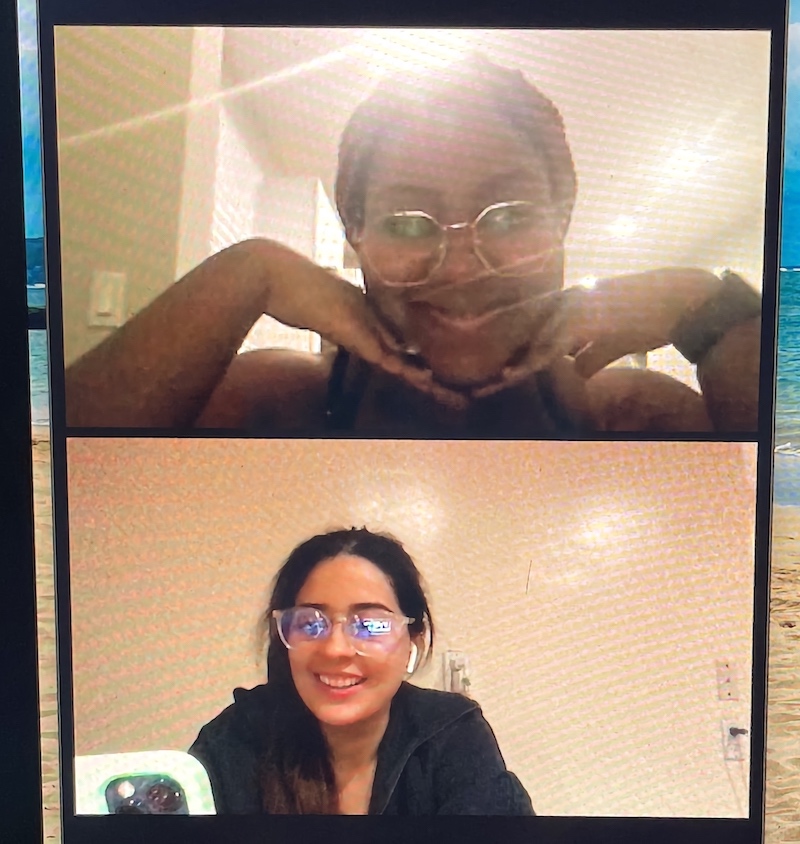
My friend Kim and I on a Zoom study break!
T — Take Practice Tests
Taking practice tests is SO useful because it combines all of the skills you need to be successful on the actual exam. They help build endurance, help determine how long you take to complete the exam, and illuminate areas for you to focus on during your studies!
123s
Another huge component of NBCOT prep is making sure that you are taking care of yourself so that you have the energy and mental capacity to study! This is more easily said than done but hopefully these tips will help.
1 — Listen to Your Mind and Body
Honestly, some days are going to be better than others. Some days you are going to be studying and really understanding the material and motivated to keep going. Other days, you may be tired, overwhelmed or busy with other things, or just not have the energy to study. And guess what, that’s OKAY! The process of studying for this exam is just that, a process, and the results will be a culmination of the effort you put into your preparation. That means, if one day you feel like you just cannot focus or are too exhausted to study, give yourself some grace and rearrange your study schedule. I promise it is 100% better than trying to push through and burning yourself out. Extra Tip: schedule rest days into your study schedule! It can help ease the apprehension that can come with taking a day off!
2 — Do Your Self Care!
This counts for during your studying as well as before the exam. This is a great time to practice what we preach, take time to do the small things that make you happy and the things that make you feel like your most authentic self. It is easy to assume the identity of “studying for the NBCOT” and let that and the stress consume us (guilty as charged) but it doesn’t have to be that way.
Extra-Extra Tip: The day before your exam, don’t touch any of your study materials and schedule some R&R activities for yourself. Spend some time with family or friends, grab your favorite latte, just do things that make you feel good. I promise, your brain and body will thank you.
3 — Affirm and Reaffirm Yourself . . . and Reaffirm Yourself Again!
Mindset is EVERYTHING and this starts way before test day. While you are studying it is easy to get down on yourself or doubt your abilities but it is important to reaffirm yourself that you can do this! Positive self-talk and reframing how you’re feeling will go miles farther than putting yourself down; it could even be the extra edge that helps you pass.
⋯






